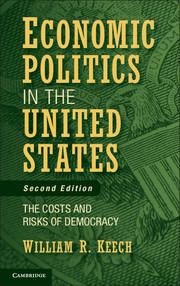Book contents
- Frontmatter
- Contents
- List of Figures and Tables
- Preface to the Second Edition
- Preface to the First Edition
- Part One Introduction
- Part Two Models of Macroeconomic Politics in a Democracy
- Part Three The Sources and Authority of Macroeconomic Goals
- Part Four Institutions and Processes
- Part Five Conclusion
- References
- Index
Part Two - Models of Macroeconomic Politics in a Democracy
Published online by Cambridge University Press: 05 June 2014
- Frontmatter
- Contents
- List of Figures and Tables
- Preface to the Second Edition
- Preface to the First Edition
- Part One Introduction
- Part Two Models of Macroeconomic Politics in a Democracy
- Part Three The Sources and Authority of Macroeconomic Goals
- Part Four Institutions and Processes
- Part Five Conclusion
- References
- Index
Summary
This section reviews contemporary political economy models of political behavior. The first two chapters address models of routine electoral politics. Chapter 3, Models of Accountability and Opportunism, deals with the timing of elections and how opportunistic politicians might try to manipulate the economy for their own benefit. Chapter 4, Models of Choice, deals with how different parties might structure the choices available to voters. Both are models of regular politics revolving around elections, the most visible of the defining characteristics of democracy.
Both the electoral cycle and the partisan models have advanced in the past decades. One major source of this progress is the recognition of the wider implications of the uncertainty introduced by elections. Elections as institutions of accountability and choice also inevitably introduce the possibility that the identity of governments will change, and this uncertainty can have economic consequences that may or may not be constructive. Almost all models of routine politics assume that incumbents or parties are motivated by policy goals, office goals, or a combination of the two.
Chapter 5 is a new chapter in this edition about irregular or non-routine politics in the United States. It identifies some of the ways that political choices have had unintended adverse consequences. This chapter also deals with irregular events such as financial crises and shows the importance of time-consistency and moral hazard. It raises questions about the benign message of the previous edition of this book. Chapter 5 also addresses the second essential feature of democracy – limitations on government. In the United States, this includes separation of powers and the freedom to petition the government for redress of grievances (i.e., to lobby).
- Type
- Chapter
- Information
- Economic Politics in the United StatesThe Costs and Risks of Democracy, pp. 55 - 56Publisher: Cambridge University PressPrint publication year: 2013



